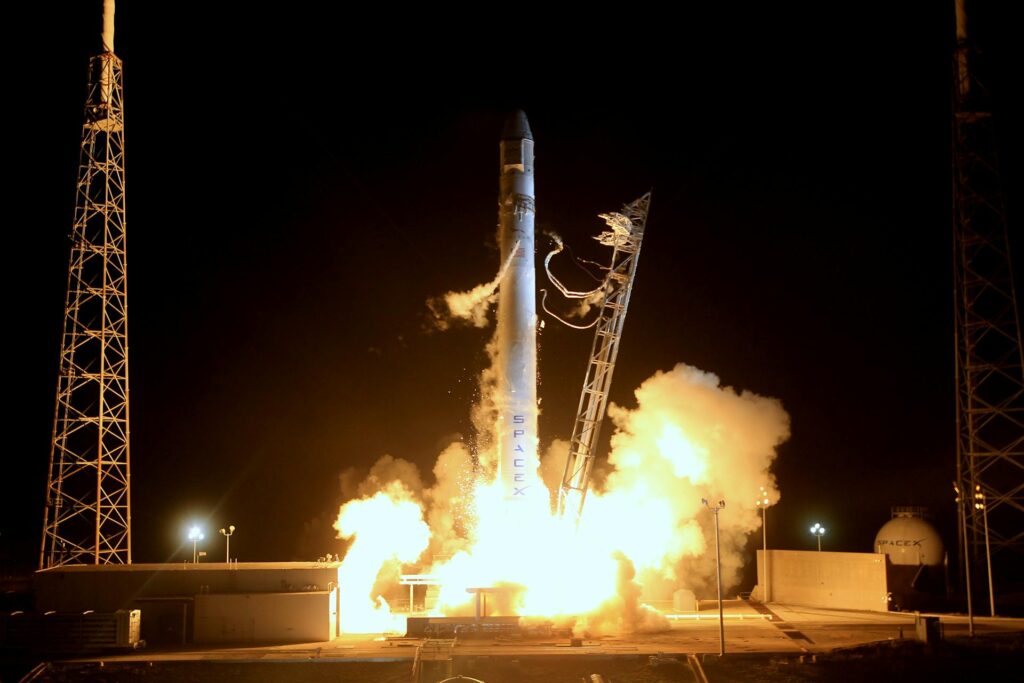
Have you ever looked up at the night sky and wondered if we’ll ever set foot on Mars? Well, buckle up, because the race to Mars is on! Private companies and government agencies are all vying to be the first to send humans on this incredible journey. Let’s blast off and explore the exciting world of Mars exploration!
Mars Mania: The Race to the Red Planet Heats Up!
Imagine This: It’s the year 2040. A powerful rocket launches from Earth, carrying a crew of astronauts on a daring mission to Mars. After months of travel, they touch down on the rusty red surface, becoming the first humans to ever walk on another planet! This is the dream that motivates scientists, engineers, and space enthusiasts around the world.
Also Read: Exploring The Benefits Of Virtual Reality in Pain Management
Who’s in the Race to Mars?
There are two main players in the Mars exploration game:
- Private Companies: Ambitious companies like SpaceX and Blue Origin are leading the charge with their own rockets and spacecraft. They see Mars as a potential future home for humanity and a business opportunity.
- Government Agencies: Space agencies like NASA (the National Aeronautics and Space Administration) are also heavily involved in Mars exploration, driven by scientific discovery and a desire to push the boundaries of human exploration.


Why Go to Mars?
Mars is our closest planetary neighbor, and it holds a lot of mysteries. Scientists believe Mars may have once been much wetter and more Earth-like than it is today. Here are some reasons why sending humans to Mars is so exciting:
- Search for Life: Could there be, or have there ever been, microbes or even simple life forms on Mars? Studying the Martian environment could answer one of humanity’s biggest questions: are we alone in the universe?
- Understanding Climate Change: By studying Mars, we can learn more about how planets change over time. This knowledge could help us understand climate change on Earth and how to protect our own planet.


- A Stepping Stone: Mars could be a stepping stone for future exploration of the solar system. Learning how to live and work on another planet will be crucial for venturing further into space.
The Challenges of Reaching Mars
Getting to Mars is no easy feat. Here are some of the hurdles astronauts and engineers need to overcome:
- The Distance: Mars is very far away! It takes months to travel between Earth and Mars, depending on the positions of the planets in their orbits.
- The Harsh Environment: Mars is a cold, dry, and dusty place with a thin atmosphere that offers little protection from radiation. Astronauts will need special suits and habitats to survive.
- The Unknown: We still have a lot to learn about Mars. There could be unexpected dangers or challenges waiting for us on the Red Planet.
How Are We Preparing for the Journey?
Both private companies and government agencies are working hard to develop the technology needed for a successful Mars mission. Here are some of the things they’re focusing on:
- Powerful Rockets: Getting to Mars requires incredibly powerful rockets to lift heavy payloads off Earth and achieve the necessary escape velocity.
- Spacecraft Design: Spacecraft need to be comfortable and functional for astronauts to live and work in for months on end during the long journey.
- Life Support Systems: These systems will provide astronauts with breathable air, water, food, and waste management capabilities.
- Landing Technologies: Landing safely on the Martian surface is a critical challenge. Developing reliable landing systems is essential.
The Future of Mars Exploration
The race to Mars is just getting started. While there’s no exact date set for the first human landing, many experts believe it could happen sometime in the 2030s or 2040s. Here are some things to consider for the future:
- International Collaboration: The challenges of Mars exploration are so great that international cooperation between space agencies and private companies may be necessary.
- Ethical Considerations: Sending humans to Mars raises ethical questions. Who gets to go? How will we protect the Martian environment? These issues need to be carefully considered.
- The Impact on Humanity: A successful Mars mission would be a monumental achievement for humanity. It would inspire future generations and push the boundaries of scientific discovery.
Beyond the Headlines: Different Approaches to Mars Exploration
The race to Mars isn’t just about who gets there first. There are different approaches to Mars exploration:
- Government-Led Missions: These missions prioritize scientific discovery and international cooperation. NASA’s Artemis program aims to land the first woman and the next man on the Moon in preparation for future Mars missions.
- Private Company Ventures: Private companies like SpaceX are focused on developing reusable rockets and spacecraft to make Mars travel more affordable and accessible. They envision Mars as a potential future home for humanity and a business opportunity.
Engaging with the Red Planet: How You Can Be Part of the Mars Mission (Even from Earth!)
The race to Mars isn’t just for astronauts and rocket scientists! Here are some ways you can get involved and explore the Red Planet from Earth:
- Citizen Science Projects: Participate in online projects that help analyze data from Mars rovers and orbiters. You can be part of scientific discovery! (https://science.nasa.gov/citizen-science/)
- Educational Resources: Many websites and museums offer educational resources about Mars exploration. Learn about the science, technology, and history of our quest to reach the Red Planet. (https://science.nasa.gov/mars/)
- Space Camps and Programs: Immerse yourself in the world of space exploration through educational camps and programs offered by organizations like NASA. They can spark your interest in STEM fields (Science, Technology, Engineering, and Math). (https://www.nasa.gov/learning-resources/)
The Final Frontier: A Journey of Discovery Awaits
The race to Mars is a thrilling adventure that pushes the boundaries of human potential. It’s about scientific discovery, technological innovation, and the enduring human spirit of exploration. While the challenges are immense, the potential rewards are even greater. By working together, we may one day take those giant leaps across the solar system and establish a foothold on the Red Planet. Are you ready for the journey?
The Race to Mars: Private and Public Space Missions – FAQs
The race to Mars is full of exciting possibilities and complex challenges. Here are some frequently asked questions to delve deeper into this captivating topic:
- Isn’t Mars super far away? How long would it take to get there?
Yes, Mars is very far away! The exact travel time depends on the positions of Earth and Mars in their orbits. At the closest point, it can take around six months to travel between the two planets. However, at the farthest point, it could take up to eight months or even longer.
- Sounds dangerous! What kind of environment will astronauts face on Mars?
Mars is a harsh and unforgiving place. It’s a cold, dry desert with a thin atmosphere that offers little protection from the harsh radiation from the sun. There’s also no liquid water on the surface, although there’s evidence of ice deposits in the polar ice caps and potentially underground.
- So, how will astronauts survive on Mars?
Astronauts will need specially designed spacesuits to protect them from the extreme temperatures, radiation, and lack of oxygen. They’ll also live in pressurized habitats with breathable air, water, and food supplies. These habitats will likely need to be partially self-sufficient, with systems for recycling water and waste.
- Isn’t sending humans to Mars a waste of money? Shouldn’t we focus on problems here on Earth?
This is a valid question. Space exploration is expensive, and there are many challenges facing our planet. However, advancements in space technology often have practical applications here on Earth. For example, research conducted for Mars missions can lead to innovations in areas like renewable energy, medicine, and materials science.
- What are the potential benefits of going to Mars?
There are many potential benefits to Mars exploration:
- Scientific Discovery: Studying Mars could answer fundamental questions about the possibility of life beyond Earth and how our solar system formed.
- Understanding Climate Change: Studying Mars can help us understand how planets change over time, which could improve our understanding of climate change on Earth.
- Technological Innovation: The challenges of Mars exploration will drive innovation in many fields, leading to new technologies that benefit society.
- Who will get to go on the first crewed mission to Mars?
This is yet to be determined. Astronauts for the first Mars mission will likely need to be highly qualified and experienced, with expertise in various scientific disciplines and piloting skills. Physical and mental fitness will also be crucial for surviving the long journey and harsh Martian environment.
- Will the race to Mars be a competition between countries, or will there be international cooperation?
The challenges of Mars exploration are so immense that some experts believe international cooperation between space agencies and private companies will be necessary. Sharing resources, expertise, and technology could increase the chances of a successful mission.
- What are some of the ethical considerations surrounding Mars exploration?
There are several ethical issues to consider, such as:
- Who gets to go to Mars? Will it be limited to a select few astronauts, or will there be opportunities for a wider range of people?
- Protecting the Martian environment: We need to ensure that human activity on Mars doesn’t contaminate the planet or destroy any potential evidence of past or present life.
- The long-term impact on astronauts: The physical and psychological effects of spending years in space and on Mars need to be carefully studied.
- What are some of the challenges private companies face in the race to Mars?
Private companies need to develop reliable and cost-effective rockets and spacecraft for deep space travel. They also face challenges in financing these long-term missions and ensuring the safety and well-being of their astronauts.
- Do you think we’ll ever colonize Mars?
Colonizing Mars, meaning establishing a permanent human presence on the planet, is a long-term goal for some. The technological and logistical hurdles are immense, but the potential benefits are significant. Only time will tell if and when this ambitious vision becomes a reality.

